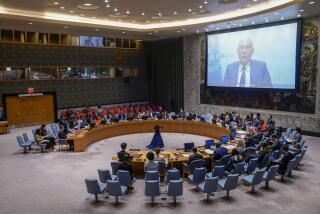U.S. Wants N. Korea Issue to Go to the U.N.
- Share via
SEOUL — SEOUL -- Keeping up the heat on North Korea, a senior U.S. envoy said Wednesday that he expects the imbroglio over Pyongyang’s suspected nuclear weapons program to be referred to the U.N. Security Council by the end of the week.
John R. Bolton, the Bush administration’s top arms control official, told reporters here that a consensus was emerging to bring the weight of the U.N. to bear on the standoff.
“I don’t think it’s a question of if it will go to the Security Council.... It’s only a matter of time,” Bolton said on a whistle-stop tour of Asia.
But at the United Nations, diplomats say they don’t expect the council to take up the issue just yet. Russian officials have told the U.N.’s nuclear regulatory arm, the International Atomic Energy Agency, that their envoy in North Korea seems to be making progress and that they would like a little more time before handing the matter over to the council.
Any decision to involve the U.N. is likely to infuriate North Korea, which has insisted that the dispute is between Pyongyang and Washington alone.
Of the Security Council’s five permanent members -- which include the United States and which are all nuclear powers -- Bolton said that Britain and France support bringing the issue before the U.N.’s ruling body, China doesn’t object and Russia will probably also agree.
But Russian Deputy Foreign Minister Alexander Losyukov said Wednesday after discussions in Pyongyang, the North Korean capital, that the regime was willing to reopen a dialogue with the U.S. to settle the crisis.
“The North Korean side is prepared for a dialogue with Washington
U.N. advisor Maurice Strong said Wednesday after returning from talks in North Korea that Pyongyang and Washington are not that far apart in their positions and that Russia’s efforts could well bear fruit. All that’s missing is an international framework to resolve the dispute, he said.
Bolton took a harder line, saying that Pyongyang’s effort to develop uranium for possible use in nuclear weapons, its expulsion of international inspectors and its withdrawal from the Nuclear Nonproliferation Treaty have created grounds for Security Council oversight.
North Korea’s actions are “a threat to international peace and security, and it’s appropriate that we go to the Security Council,” he told reporters.
With its economy in tatters -- a situation aggravated by the recent U.S.-led suspension of fuel oil shipments -- the North fears the threat of U.N. sanctions, which it has warned it would regard as a declaration of war.
Bolton stressed that sanctions were not an automatic response but rather part of “a broad range of options.” He didn’t elaborate on what the other options might be.
The U.S. envoy’s comments combined tough-sounding rhetoric with signals of some flexibility, a mix that characterizes the Bush administration’s evolving approach to the standoff. Bolton condemned North Korea for “bad behavior” and for trying to “blackmail” the U.S. into negotiations, and he described Pyongyang’s demand for written security guarantees from the U.S. as a “red herring.”
Yet he repeated President Bush’s pledge not to attack North Korea and said the administration is open to the idea of providing some kind of security assurance in writing.
For its part, a North Korean delegation in Seoul for officially unrelated talks with the South reiterated Pyongyang’s insistence that it doesn’t intend to build nuclear weapons.
The Cabinet-level negotiations are to focus on humanitarian cooperation between the Koreas, but officials from the South opened the meeting by urging the North to abandon its nuclear program.
“The South side delivered our position that if the nuclear problem is not resolved, resolving North-South problems will also face difficulties,” spokesman Rhee Bong Jo said.
At another set of inter-Korean talks, officials from the International Committee of the Red Cross agreed Wednesday to set up a new round of reunions of family members separated by the 1950-53 Korean War. The next reunions are to take place Feb. 20-25. Work on a permanent reunion center could start in April, officials said.
*
Chu reported from Seoul and Farley from the United Nations.
More to Read
Sign up for Essential California
The most important California stories and recommendations in your inbox every morning.
You may occasionally receive promotional content from the Los Angeles Times.














